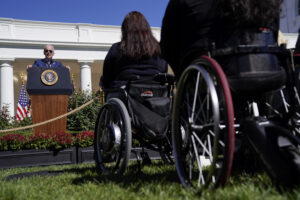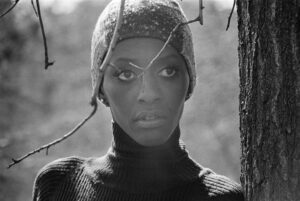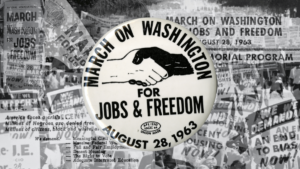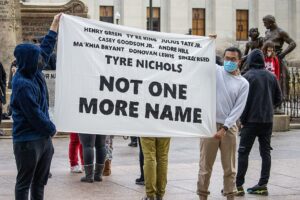United by Hate
How did thousands of African-Americans come to descend on the town of Jena, La., on Thursday for a march and rally that brought to mind the heady days of the civil rights movement? The answer says as much about what has changed over the past half-century as it says about what hasn't.WASHINGTON — How did thousands of African-Americans come to descend on the town of Jena, La., on Thursday for a march and rally that brought to mind the heady days of the civil rights movement? The answer says as much about what has changed over the past half-century as it says about what hasn’t.
Most people know the outlines of the story by now, but here’s a synopsis: Black students at the local high school sat under a tree that everyone knew was a place where white students usually congregated. White students reacted by hanging three nooses in the tree. Racial tensions escalated from there, including fights in which both black and white students got roughed up but no one was seriously injured. Local authorities, who are white, handled the white offenders with a “boys will be boys” attitude — a few brief school suspensions, basically. Black offenders were expelled from school, arrested and charged as adults with felony offenses, including attempted murder.
These events happened in 2006. For months, they utterly failed to penetrate the national consciousness. We still might not know about what was happening in Jena if the case hadn’t been noticed by Internet bloggers, who sounded the alarm. And I’m quite sure there would have been no busloads of protesters descending on Jena if the cause hadn’t been taken up by a radio personality best known for R-rated banter about sex and relationships.
Michael Baisden, whose afternoon drive-time show “Love, Lust & Lies” is heard in urban markets across the country, launched a crusade on behalf of the “Jena Six” — a group of black students, aged 15 to 17 when they allegedly beat up a white schoolmate, and who still face adult charges of aggravated battery that could send them to prison for up to 20 years. The hours that Baisden normally would have spent in risque repartee with “grown and sexy” callers about romance or infidelity were devoted instead to the Jena case.
The obvious issue was one of equal justice: Either treat the whole series of incidents as a mere disciplinary problem for the high school to handle, or treat it as a criminal matter. Just don’t have one standard of justice for whites and another, much harsher standard for blacks.
The cause was then taken up by other black radio hosts — Tom Joyner, whose morning drive-time show has enormous reach; Steve Harvey, the comedian whose morning show usually covers the same “Does he really love me?” territory as does Baisden’s; the Rev. Al Sharpton, whose show, as you might expect, was already heavy on politics and activism.
Thursday morning, as the throng descended on Jena, both the Joyner and Harvey shows featured live updates from the scene. Baisden and Sharpton were in Jena, helping lead the demonstrations. It’s fair to say that without black radio, the case of the Jena Six probably never would have become a significant national story — and certainly never would have sparked one of the biggest civil rights protests in decades.
Why is this interesting? Because black America is increasingly complicated and diverse, riven by fault lines that didn’t exist back when the great civil rights heroes were marching in Selma. We’re not forced by law to live in the same neighborhoods or go to the same schools anymore. A generation has reached adulthood without ever experiencing the in-your-face racism of the Jim Crow era. There are black families who have had multigenerational middle-class success, and black families trapped in multigenerational poverty and dysfunction.
Black radio is one of the places where all the varied segments of black America still come together. It’s a true community medium, even if what we still call “the black community” is, for most purposes, best thought of as plural.
But Thursday’s protest needed more than the right medium, it needed the right message. When a local prosecutor in a small Southern town is confronted with a racial clash and he gives the whites a mild slap on the wrist while trying his best to send the blacks to prison, there aren’t many black Americans who feel they can enjoy the luxury of indifference.
We don’t see that many instances of overt, unapologetic, separate-and-unequal racial discrimination these days, thank goodness. Let’s hope we never see another. Because when something like Jena happens, we’re reminded, as the Rev. Martin Luther King Jr. wrote in his letter from the Birmingham jail, that “injustice anywhere is a threat to justice everywhere.” And we’re reminded that however diverse we are, to some people we all look alike.
Eugene Robinson’s e-mail address is eugenerobinson(at)washpost.com.
© 2007, Washington Post Writers Group
Your support matters…Independent journalism is under threat and overshadowed by heavily funded mainstream media.
You can help level the playing field. Become a member.
Your tax-deductible contribution keeps us digging beneath the headlines to give you thought-provoking, investigative reporting and analysis that unearths what's really happening- without compromise.
Give today to support our courageous, independent journalists.






You need to be a supporter to comment.
There are currently no responses to this article.
Be the first to respond.